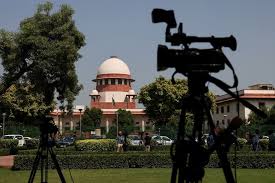We deem it necessary to briefly state the history of classification of these two competing entries which have been the pivotal issue in all these groups of appeals before this Court, i.e., CET SH 2403 9910 (‘chewing tobacco’) and CET SH 2403 9930 (‘zarda/jarda scented tobacco’) (Para 10)
At the outset, it may be noticed that the expressions ‘chewing tobacco’ and ‘zarda/jarda scented tobacco’ are nowhere defined under the CE ACT or CETA. CETA initially covered ‘tobacco’ in item No.9 to the schedule. Entry 9(II) was country tobacco and sub-clause (2) thereof read “if intended for sale as chewing tobacco, whether manufactured or merely cured.” In 1983, ‘tobacco’ was covered under Item 4 of the Schedule of the CE Act. (Para 11)
Thus, it is clear that the stand of the assessee has been consistent to the effect that product manufactured by it is to be classified as ‘zarda/jarda scented tobacco’ and at the insistence of the jurisdictional Deputy Commissioner the assessee was classifying the goods under CET SH 2403 9910 i.e., ‘chewing tobacco’, for which there was also an order of determination passed under Rule 6(2) of CTPM rules. Whereas in the other matters, namely Urmin and Flakes-n-Flavourz, the facts were entirely different. In Urmin Products the assessee had declared the product as ‘chewing tobacco’ and then changed the classification to ‘zarda/jarda scented tobacco’ and again came back to the original position of declaring it or classifying it as ‘chewing tobacco’. These classifications in Urmin Products were at the behest of the assessee himself. In Flakes-n-Flavourz, the assessee was alleged to be manufacturing ‘zarda/jarda scented tobacco’ and clearing it as ‘chewing tobacco’, and on facts it was found that there were additives added to the tobacco. In the said case this Court on facts held that there was no wilful suppression attributable to the assesssee and the Revenue had failed to establish the product as ‘zarda scented tobaccot’. (Para 138)
In the instant case the assessee had clearly declared his product as ‘zarda/jarda scented tobacco’ falling under sub-heading 2403 9930 in Form 1 filed and based on the said declaration, capacity determination order dated 04.03.2015 under rule 6(2) had been passed re-classifying the product as ‘chewing tobacco’. Accordingly, for the period April 2015 in Form-1 the assessee had described the product as ‘Jayanti Zarda Scented- 2403 9910’. However, in the capacity determination order dated 05.05.2015, the Deputy Commissioner classified the goods as ‘chewing tobacco’. As such, there was no misstatement or suppression of facts, collusion, or fraud in the instant case and hence on facts, the principles enunciated in Urmin’s case is distinguishable. (Para 139)
In the facts of the present case, there has been no penalty levied under Rule 26 on the ground that there has been no intent to evade duty. In fact, the commissioner in his order dated 27.09.2017 concludes at para 48.2 to the following effect: “..in view of the above there is no fraud or collusion or any wilful misstatement or separation of facts with intent to evade payment of duty to invoke the provisions of Section 11A (4) of Central Excise Act, 1944 in the present case. (Para 140)
SUPREME COURT OF INDIA
2023 STPL(Web) 381 SC
[2023 INSC 951]
Commr. Of Cen. Exc. Ahmedabad Vs. M/S Urmin Products P. Ltd. And Others
Civil Appeal No.10159-10161 of 2010 With Civil Appeal No.6519 Of 2023 (@ Diary No.6888 Of 2020) With Civil Appeal No.2469 Of 2020 With Civil Appeal No.6521 Of 2023 (@ Diary No.3492 Of 2020) With Civil Appeal No.6522 Of 2023 (@ Diary No.3487 Of 2020) With Civil Appeal Nos.6523-24 Of 2023 (@ Diary No.2810 Of 2020) With Civil Appeal No.959 Of 2019 With Civil Appeal Nos.6538-42 Of 2023 (@ Diary No.14581 Of 2019) With Civil Appeal No.6531-37 Of 2023 (@ Diary No.44912 Of 2019) With Civil Appeal No.6525 Of 2023 (@ Diary No.3484 Of 2020) With Civil Appeal No.6526 Of 2023 (@ Diary No.3513 Of 2020) With Civil Appeal No.6527 Of 2023 (@ Diary No.3536 Of 2020) With Civil Appeal No.6528 Of 2023 (@ Diary No.3544 Of 2020) With Civil Appeal No.6529 Of 2023 (@ Diary No.3545 Of 2020) With Civil Appeal No.6530 Of 2023 (@ Diary No.3547 Of 2020) With Civil Appeal No. 5146 Of 2015 With Civil Appeal No.3596 Of 2023-Decided on 20-10-2023
https://stpllaw.in/wp-content/uploads/2023/10/2023-STPLWeb-381-SC.pdf







